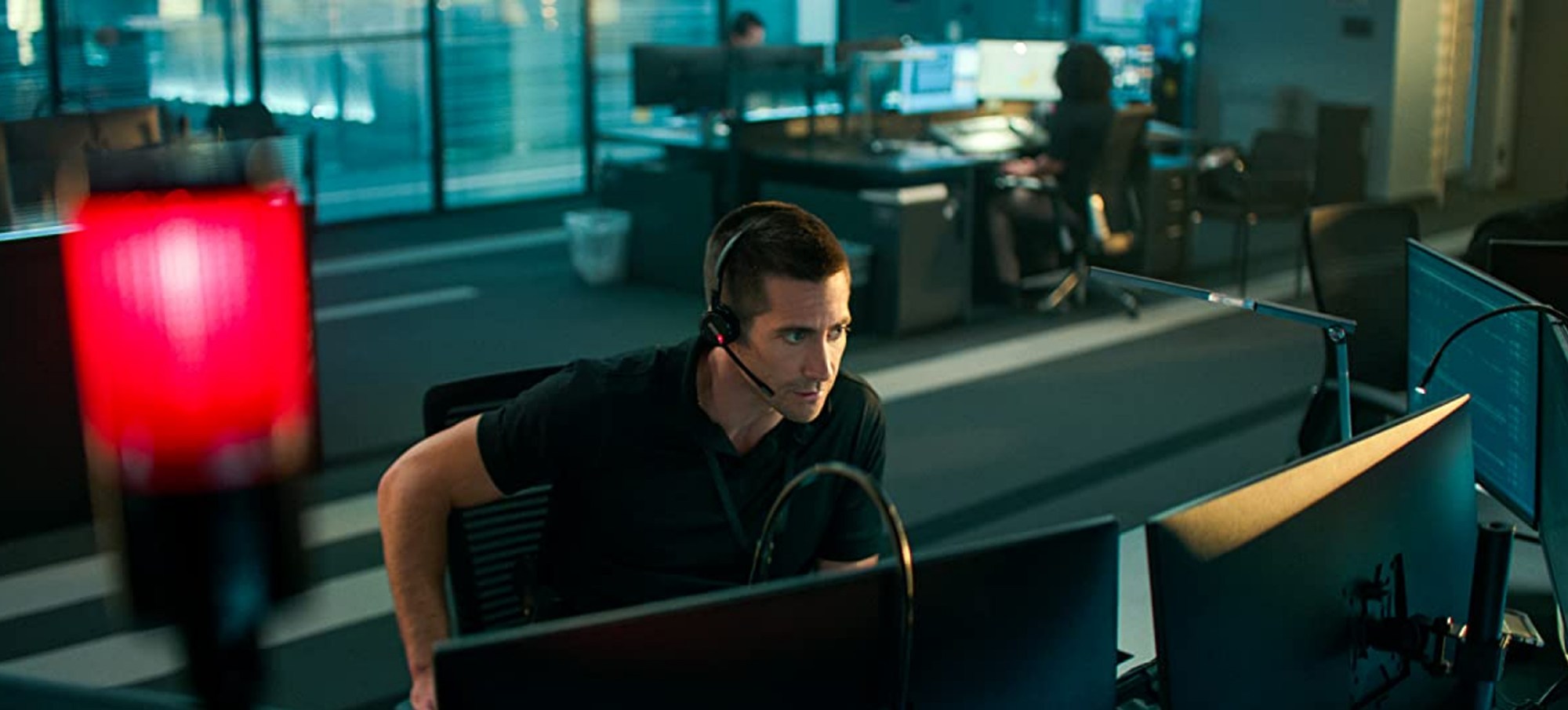
- Festivals
2021 TIFF Notes: “The Guilty” (2021): Covid Enhances Claustrophobic Thriller
The Guilty stars Jake Gyllenhaal in a remake of the 2019 Danish Oscar entry, Den Skylidge about a 911 dispatcher in a race against time as he endeavors to save a kidnapped woman. In this rendition, a woman (Riley Keough) is held captive in a moving van on an LA highway. The film was directed by Antoine Fuqua, marking his second collaboration with Gyllenhaal following 2015’s Southpaw.
Gyllenhaal plays Joe Baylor, an angst-ridden, world-weary LAPD cop who has no choice but to bend the rules in order to rescue the distressed caller. The screenplay was written by Nic Pizzolatto (True Detective), and the stellar cast is rounded out by Ethan Hawke, Paul Dano, Peter Sarsgaard and Christine Vidal.
Gyllenhaal also serves as producer and has been a fan of the story since he watched the original Danish version in 2018. “I immediately tried to figure out how to get the rights,” he explains. “I thought of it as an incredible translation in the American context and felt there were so many themes underlying it that translated and transposed so well. And to make a long story short, I came to Antoine and said ‘I have something, will you read it?’ And to his credit, with his incredibly busy schedule, he said he wanted to make the movie.”
The film was budgeted at a reported $9 million and was shot in Los Angeles during the pandemic. Fuqua talks about the challenges. “It was daunting but exciting at the same time because we had the element of the COVID danger of someone getting hurt. And Jake said to me, ‘If you’re ever going to do one during the height of COVID, this is the one,” he says. “It’s contained, the camera is mainly on Jake, but there’s still a whole world you have to create. We had to come up with efficient ways to do it and keep everyone safe at the same time, right down to all the earpieces which had plastic all over them, and there was plastic on the floor.” He shakes his head. “It was like a movie within a movie. It was bizarre.”
“I had always pictured shooting it in a very short period of time.” Gyllenhaal told festival press at TIFF. “I thought it’d be a great challenge, and the tension that the movie has inherently would only be increased exponentially if we shot it that way.” He leans forward. “And besides, I’ve always thought the only way you get a filmmaker like Antoine to do a movie like this is by telling them they can make it in a week because that’s all the time they have.” He pauses. “So with my producer’s hat on, I thought this was the way to get him.”
The film was shot in record time. “We shot the movie in eleven days, basically, twenty pages a day,” says Gyllenhaal. The high-stakes scenario wasn’t for the screen alone. “Three days before we started shooting, someone very close to Antoine tested positive so he had to go into quarantine. He subsequently tested negative a number of days after that but by state law, he had to be in quarantine,” Gyllenhaal explains. “We hardwired a van and he directed the entire movie from this van with walkie-talkies next to him. Almost every department head was on monitors in front of him in this van. He was sort of God’s eye, so he could move the cameras around where he could see everybody move, and he could cue the extras and communicate with his first AD and the whole crew.”
Fuqua nods. “It was weird at first because it felt like you were conducting. It was really challenging, but then it became really exhilarating because the van is a really high-tech van. I’d push a button and the doors would shut. It was dark, there were monitors, and I was just in my world,” he recalls. “I was in the zone.”
Considering the problems that COVID presented, the shoot required nerves of steel on the part of the actors and the crew. It seemed that Gyllenhaal was not fazed in the least. He smiles. “I always love obstacles; I always love a challenge.”

